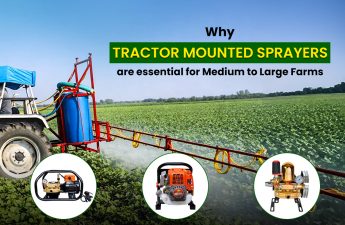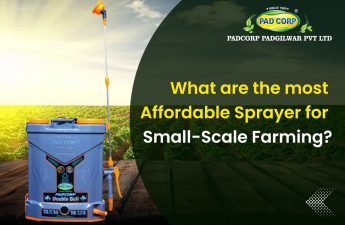Do you want to know about sustainable agriculture practices in India?
Padgilwar Corporation, the leading manufacturer of agriculture equipment and tools, is here to educate you all about sustainable agricultural practices followed by Indian farmers.
In India, practitioners of sustainable agriculture strive to incorporate three main goals into their work: a healthy environment, economic profitability, and social and economic equity. Food processors, distributors, producers, retailers, consumers, and waste management professionals can contribute to a more sustainable agricultural system. It also helps to reduce greenhouse gas emissions and conserve energy. In this blog, we will learn about what is and what type of sustainable agriculture is followed in India and what are its advantages.
What do you understand by sustainable agriculture?
Sustainable agriculture uses environmentally friendly energy sources such as hydropower, wind farms, and solar power. Solar panels are used to power heating systems as well as pumping systems. Furthermore, hydroelectric power is used to power various agricultural machinery. In the following section, you can learn more about the need for sustainable agriculture methods and the benefits of sustainable agriculture.
Stainable agriculture aims at eliminating hunger, improving nutrition, and contributing to food security. The agricultural sector contributes to the achievement of the United Nations Agriculture and Sustainable Development Goal of ending hunger by 2030. Furthermore, this is the primary goal of sustainable agriculture and food security.
Types of the sustainable agriculture practised in India
- Crop Rotation
Crop rotation is the most preferred sustainable agriculture technique. Its purpose, however, is to avoid the consequences of planting the same crop in the same soil for multiple years in a row. This aids in pest control because many pests prefer specific crops. Furthermore, rotation disrupts the insect’s reproductive cycle. Farmers can plant crops that supplement the plant’s nutrients during rotation. Rotation disrupts pest reproduction cycles. Farmers plant specific crops to replenish the soil with essential nutrients. However, the use of chemical fertilizers is reduced in these sustainable crops. - Permaculture
Permaculture is a food production system designed to reduce resource waste and increase production efficiency. Growing grain without tillage, herb and plant spirals, keyhole and mandala gardens, polyculture garden beds, sheet mulching, and each plant serving multiple purposes are also included in these design techniques. - Crop Coverage
Many farmers prefer to plant crops in a single field at all times, never leaving it barren; however, this may have unintended consequences. Planting cover crops such as clover or oats can help the farmer achieve his goals of preventing soil erosion, improving soil quality, and suppressing weed growth. The use of cover crops also reduces the need for chemicals such as fertilisers. - Soil Improvement
Soil is an important part of the agricultural ecosystem. Good soil can help increase yields and produce healthier crops. It is possible to maintain and also beneficial in improving soil quality in a variety of ways. Some examples include the use of composted plant material or animal manure, as well as the release of crop residues into the field after harvest. - Naturally Occurring Pest Predators
To maintain effective pest control, it is critical to view the farm as an ecosystem rather than a factory. Many animals and birds, for example, are natural predators of agricultural pests. As a result, manage your farm so that populations of these insect predators can thrive. Chemical insecticides, on the other hand, can result in the indiscriminate killing of insects. - Biologically Based Integrated Pest Management
Integrated Pest Management is a method that relies on biological rather than chemical methods. The IMP also emphasises the importance of crop rotation in pest management. IPM will ensure that chemical solutions are only used as a last resort once the pest problem has been identified. - Polyculture Agriculture
Polyculture farming is similar to crop rotation in that it seeks to maximise yield by adhering to natural principles. As a result, it grows multiple crop species in a single region. Furthermore, these species generally complement one another and help produce a wider range of products on the same plot while fully utilising the available resources. Because of the high biodiversity, the polyculture sustainable farming system is more adaptable to seasonal fluctuations. - Agroforestry
Agroforestry has emerged as a powerful tool for farmers in arid regions with desertifying soils. It also engaged in the development of trees and shrubs among crops, grazing land, and agriculture. And it is forestry practices that, when approached sustainably, provide long-term, productive, and diverse land uses. - Biodynamic Farming
Based on the “anthropology” philosophy, biodynamic farming incorporates holistic and ecological growing practices. Furthermore, it focuses on implementing practices such as composting animal manure, supplementary crops, and rotating cover crops. Furthermore, these practices produce the soil fertility required for food production. - Better Water Management
The first step in water management is selecting the appropriate crops, including local crops that are suited to the local weather conditions. Furthermore, crops that do not require a lot of water should be chosen for dry areas.
Advantages of sustainable farming
Sustainable farming brings many advantages with it. Let’s know about its major advantages. - Conserves the environment and prevents pollution
Sustainable agricultural systems have reduced the need for fossil fuels and other nonrenewable energy sources, as opposed to industrial agriculture, which relies on nonrenewable energy resources.
Producing an adequate amount of food to cater for the demand of the growing population, poses a serious threat to the soil. Sustainable farming keeps soil in place, which includes reducing or eliminating tillage, managing irrigation to reduce runoff, and keeping the soil covered with plants or mulch.
Sustainable agriculture has the potential to significantly reduce water pollution by avoiding the use of harmful fertilisers that seep into run-off water and pollute the natural environment. Methane pollution is a powerful greenhouse gas that harms the earth’s water and atmosphere.
Pollution can be significantly reduced through sustainable agricultural practices such as crop rotation, the use of natural fertiliser, and the reduction of animals per farm.
Thus, sustainable farming helps in preserving the earth’s natural resources and keeping the environment clean. - Reduces costs and focuses on profits
Sustainable practices in farming reduce the overall cost involved in farming such as eliminating the need for expensive fossil fuels, fertilizers, etc. and this leads to enhanced profitability. Farming more efficiently and moving food from farm to fork will benefit everyone involved in the agriculture industry. The Internet of Things data from sensors installed in everything from seed drills, sprayers, and spreaders to drones, satellite imagery, and soil transforms surprises into rarities. - Improves food production
The increasing population is cause for concern as it demands more food. Today, utilizing modern technology in agriculture, there is a chance to develop agricultural practices from a pure production standpoint, and sustainable agriculture is the most promising route.
Conclusion
The growing population needs to be fed but producing low-cost food besides, preserving natural resources and reducing pollution are equally important. Sustainable farming incorporating various methodologies and hi-tech solutions helps in combating several agricultural issues.
Padgilwar Corporation, based in Pune, has been in the agriculture equipment manufacturing business since 1960. We produce modern equipment and tools that help farmers in making their tasks easier and more efficient. With our latest farming solutions, farmers are able to get better yields and increased profits. To buy our products, contact us.


